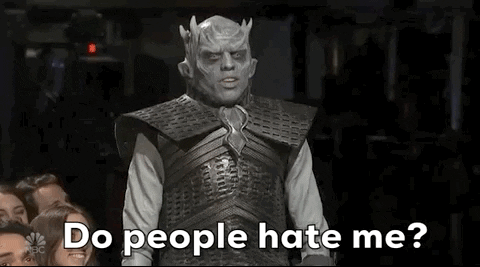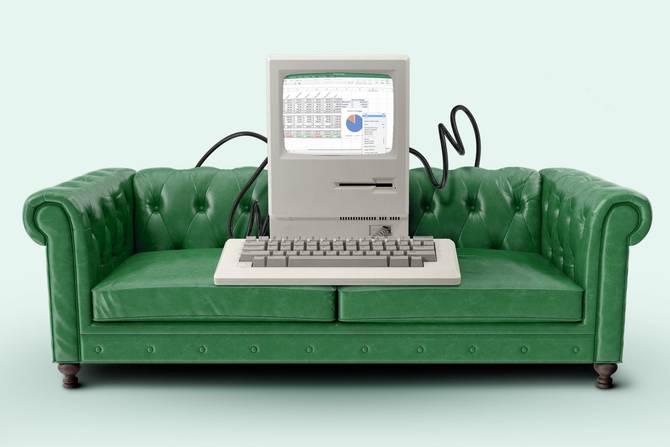Happy Monday! Did you remember to set your clocks back this weekend? We’ll gladly take the extra hour of sleep. But the sun setting while we’re still on the job? That we could do without.
In today’s edition:
 Image is everything Image is everything
 World of HR World of HR
 It’ll cost you It’ll cost you
—Sam Blum, Kristen Parisi, Drew Adamek
|
|
Saturday Night Live/NBC via Giphy
Spend enough time Googling “human resources” and you’ll find yourself confronted with an ugly truth: HR has an image problem.
The internet is rife with invective towards HR departments, including Reddit threads that detail HR horror stories. Many surveys have also reinforced the perception that employees have a loathsome view of HR. The trope has also endured in pop culture: Toby Flenderson, the misanthropic HR manager from The Office, was routinely harassed and vilified by boss Michael Scott because, as he said, Toby’s “job is to make the office lame.”
This image isn’t the result of a coordinated smear campaign financed by NBC, but it’s also not totally unwarranted, industry professionals who spoke with HR Brew explained. Traditionally, HR departments have worked in concert with company leadership, serving as messengers and enforcers of corporate policy, whether employees liked it or not.
“HR is obviously an instrument of management, so the image is not unfounded,” Liz Ryan, a former VP of HR and the founder and CEO of the consultancy Human Workplace, explained.
To win the trust of their employees, two industry professionals who spoke with HR Brew explained, HR teams need to actively engage with their workforces and impart an air of humanity, even when delivering bad news. And if professionals find that task difficult, it might be a sign that management is actively working to stymie HR’s efforts to work in its “highest and best form,” Ryan said.
Expectation vs. reality. Even as the HR profession has evolved from its bureaucratic origins and become more involved with organizations’ business decisions, an image of the paper-pushing HR manager with unwavering loyalty to the CEO has remained for many workers. There is a reason for that image, Ryan said, but it’s really only partially HR’s fault. Keep reading here.—SB
Do you work in HR or have information about your HR department we should know? Email [email protected] or DM @SammBlum on Twitter. For completely confidential conversations, ask Sam for his number on Signal.
|
|
Frank Scialabba
On Mondays, we explore what’s happening abroad in the world of HR. Got global HR news? Let us know by responding to this email.
The US wasn’t the only country to quickly adopt remote work during the height of the Covid-19 pandemic. And as life has largely returned to normal, it hasn’t been alone in considering what has and hasn’t worked, and what long-term WFH policies are worth enacting.
Much like their American counterparts, many European workers want to continue working from home at least some of the time—though some European employers do not currently allow it. But those who call the Czech Republic home may soon have their chance: The country is looking to enact legislation that would guarantee remote work protections for some employees.
What in the world? The Czech Republic does not currently regulate remote work, including when employers should accommodate employees’ WFH requests. But proposed legislation could change that, according to Expats.cz.
If it passes, ČT24 reported, the new rule would make remote work a right, rather than a benefit, for certain employees, including those who have children under age 15, are pregnant, or are carers. Employers might also be obligated to pay remote employees’ electricity, heat, and trash costs, according to reports.
Satellite view. Some business leaders and government officials are unhappy about the proposed legislation, considering it an overreach, according to ČT24.
However, countries including Spain, Ireland, Hungary, and Italy have already passed similar legislation for employers. The Czech Republic is just the latest to try to get a handle on the new world of work.
What about you, readers? Do you think that legislation is needed to help figure out the future of remote work? Reply to this email with your thoughts.—KP
Do you work in HR or have information about your HR department we should know? Email [email protected] or DM @Kris10Parisi on Twitter. For completely confidential conversations, ask Kristen for her number on Signal.
|
|
Freshsplash/Getty Images
Still debating the pros and cons of remote work? You’re not alone—just ask your finance leader, who has likely been busy drafting their own cost-benefit analysis. CFO Brew’s Drew Adamek recently reported on what it might entail.
Cost: If you want to reduce your office space footprint, breaking leases and moving out of those offices is expensive. Meta is spending nearly $3 billion to pare down its office footprint, according to its most recent earnings call. The Wall Street Journal reported last summer that several companies were taking multimillion-dollar, one-time write-downs related to real-estate reduction expenses.
Benefit: But after those initial financial losses, companies are looking at significant savings by going remote. According to an analysis by Global Workplace Analytics, a remote-work consulting firm, remote work could save US companies $500 billion annually, or $11,000 an employee.
Cost: Employees need a lot of stuff to work remotely—computers, monitors, new software—and that can add up. A 2021 Gartner survey also found that costs related to employee wellness-support programs, like virtual mental-health support, have increased and will likely continue to grow.
Benefit: Employees love it. A recent McKinsey survey found that 87% of employees take the opportunity to work remotely if offered.
Keep reading on CFO Brew.—DA
|
|
TOGETHER WITH PANERA BREAD®
|
|
Food will be provided. Add those magic words to your next meeting invite and watch the yesses flow in. Panera Catering brings the flavor to any occasion. From hot sandwiches to sweet treats, they offer quality options made with clean ingredients that are sure to please all taste buds. Order here.
|
|
Today’s top HR reads.
Stat: Unemployment reached 3.7% in October, up slightly from a “half-century low” of 3.5% in September. (CNN)
Quote: “I think because we’re seeing more of that corporate wear being worn out like streetwear, I think a lot of brands are starting to take that as inspo and market their clothes as corporate.”—Jane Yee, a 22-year-old recruiter, on why she thinks younger employees are wearing crop tops to work (the New York Times)
Read: Some believe that increased worker productivity is the key to fighting inflation and worker shortages. (USA Today)
Less is more: We surveyed nearly 2,000 US employees about their experiences with workplace tech—aka what’s working and what’s too much work. Find out what’s on their minds in this article, sponsored by Leapsome.*
*This is sponsored advertising content.
|
|
-
Fringe, a customizable benefits marketplace, raised $17 million in a recent round of funding.
-
Twitter is being sued for conducting mass layoffs without proper notice, allegedly violating the WARN Act.
-
Headspace, which merged with coaching platform Ginger to create Headspace Health, plans to become a one-stop mental health platform for employers.
-
CBS and its former CEO, Les Moonves, will pay $30 million to settle an investigation into allegations of sexual assault, insider trading, and consumer protection law violations.
|
|
Catch up on the top HR Brew stories from the recent past:
|
|
|
✳︎ A Note From Panera Bread®
For more on Clean, visit panerabread.com/clean.
Availability varies by location.
|
|
|








